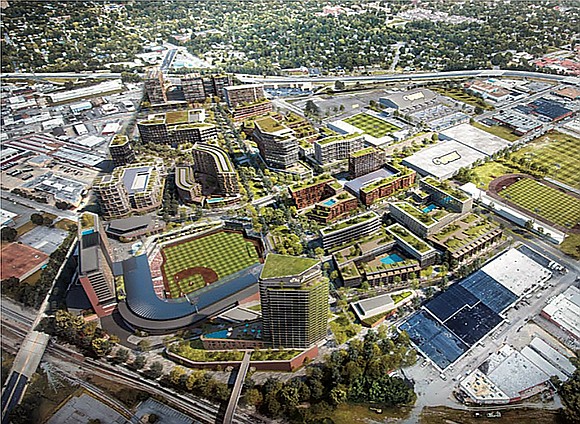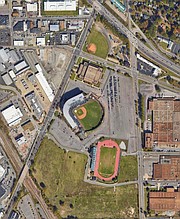Absence of motion?
Center City and Diamond District development proposals show little movement
Jeremy M. Lazarus | 11/30/2023, 6 p.m.
Slow going.
That appears to be the situation for the two largest development projects that involve City Hall.
Heading into the new year, Richmond has yet to select a developer for the $300 to $500 million, two-block Center City project in Downtown that aims to replace the vacant Coliseum with a 500-room hotel, office buildings, affordable housing and a redo of the Blues Armory.
Four teams were announced as finalists in June, but the winner remains unamed, despite a city timeline suggesting that the master developer would be announced before the end of the summer.
Even people who participated on the evaluation committee are puzzled over the lack of progress. “It’s very strange,” said one member of the evaluation team who spoke on condition of anonymity. “There has been no explanation for why this is not moving forward.”
Meanwhile, the $2.44 billion Diamond District development to create the equivalent of a small town on 67 acres in North Side where the current baseball stadium stands also remains in tortoise mode.
In the wake of the stinging defeat of the Richmond Grand Resort and Casino proposal, the project that was to be a joint venture of Kentucky-based Churchill Downs, the Diamond District — and the replacement of the baseball stadium — has become the top development priority for Mayor Levar M. Stoney as he approaches the start of his eighth and final year as the city’s chief executive.
It is not unusual for big projects to take time.
For example, Henrico County’s $2.4 billion Green City development was announced two years ago but has yet to break ground.
But even aspects of the Diamond District that Mayor Stoney and his administration were supposed to have completed in 2023 remain on the to-do list.
For example, in late April, City Council authorized the transfer of the city-owned property in the Diamond District to the Richmond Economic Development Authority – the city’s independent development arm.
However, that has not been accomplished, according to city real estate records.
Other steps remain undone, as well.
In May, Leonard Sledge, the city’s director of economic development, ticked off a list of items that were supposed to be completed by December but now will wait until next year.
The list includes:
• Finalizing the replacement baseball stadium’s design;
• Executing lease agreements with both the Flying Squirrels and Virginia Commonwealth University;
• Creating a community development authority;
• Issuing bonds to finance the baseball stadium.
The result has been to push back the start of the development that is to feature offices at least one new hotel and a mix of retail and restaurants and several thousand new apartments, condos and homes.
The administration has remained mostly mum about the Diamond District — leaving the City Council largely in the dark about the status of the project as well and about the financing, members have told the Free Press.
There have been some leaks, most notably about the sharp disagreement over the design of the new stadium between the leaders of RVA Diamond Partners LLC, the city’s chosen Diamond District master developer, and Louis J. “Lou” Dibella Jr., a well-known boxing promoter and an owner of the Flying Squirrels who has served as the team’s president and managing partner the Double A affiliate of the San Francisco Giants since 2017.
RVA Diamond Partners had chosen DLR Group, a Washington-based firm, to handle the stadium design and work on that design had begun soon after the city selected the developer in September 2022.
According to sources, disagreements arose with Mr. DiBella over the size and scope of the stadium. Ready to agree to lease the stadium from the city’s EDA for $3 million a year, he wanted a stadium worthy of a Triple A team, sources have said.
However, amid a rise in interest rates, that did not suit RVA Diamond Partners, which includes the significant real estate development firms, Republic Properties Corp. of Washington, D.C. and Thalhimer Realty Group of Henrico County, and Loop Capital, a Chicago-based investment bank.
The sources said the partnership wanted to hold down the cost to around $80 million to ensure there would be sufficient revenues to repay the borrowing.
Mr. Dibella refused to accept what he was offered once the plans became available, the Free Press has been told.
Ultimately, by late September, with both sides dug in and the stadium stalled, Lincoln Saunders, the city’s chief administrative officer, settled the matter, knowledgeable individuals have told the Free Press.
After consulting with Major League Baseball, Mr. Saunders handed control of the stadium design to the Flying Squirrels, tapped Odell Associates, a Charlotte, N.C., design firm, to work with the team and also provided Odell with a not-to-exceed construction cost, though the amount has not been disclosed.
Odell was not chosen by happenstance. In 2014, the firm provided the city with potential designs for a replacement baseball stadium at no cost—a gift that was not forgotten.
According to two city sources, the decision to change designers not only has delayed the delivery of final plans and also reduced if not eliminated RVA Diamond Partners’ responsibility for developing the stadium, which is now scheduled to be ready for the start of the 2026 baseball season.
As best as can be determined, the city is still months away from creating the Community Development Authority that would sell bonds to raise the money to build the stadium. It is still unsettled as to whether the city would have to commit to repaying those bonds if the revenues fell short in order for the CDA bonds to sell.
The city has agreed to issue such a pledge in order to sell the $35 million in bonds that will be used to replace the smaller Sports Backers soccer and track and field stadium. Mr. Sledge insisted that such a pledge would not be needed on the larger baseball stadium that could cost $110 million.








